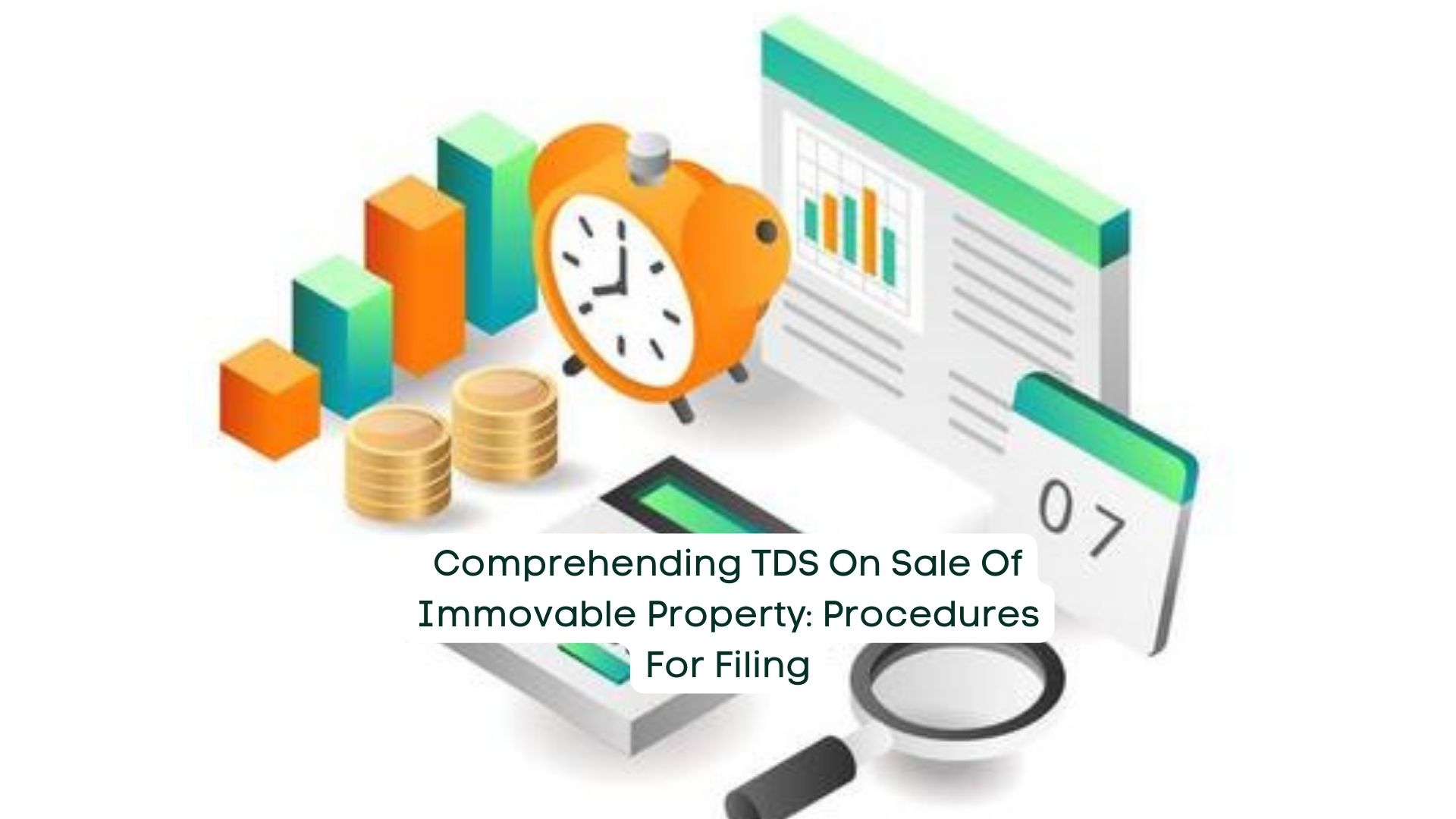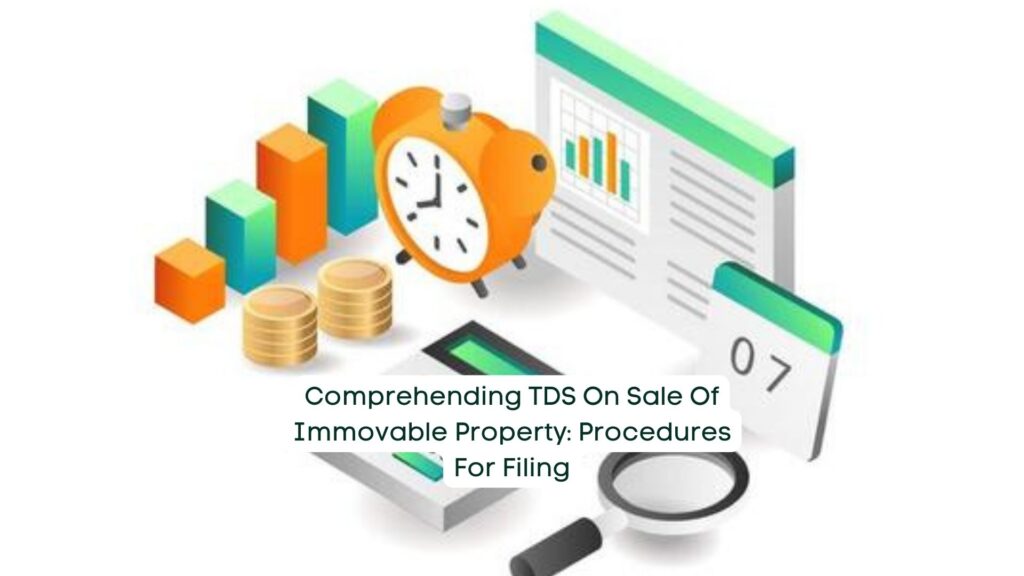
24 Feb Comprehending TDS on Sale of Immovable Property: Procedures for Filing

The term “Property” referred to capital assets encompassing flats, buildings, and even plots of land. The primary motive behind property investment lies in its potential for profit through resale at a higher value. Immovable property, attracting real estate returns, witnesses frequent transactions, including purchases and sales. However, it’s crucial to acknowledge that property transactions carry various tax implications. This article explores the concept and filing process of TDS (Tax Deducted at Source) on the sale of immovable property.
Concept of TDS on Sale of Immovable Property:
Section 194IA, introduced by the Finance Act 2013 and applicable from June 1st, 2013, mandated individuals purchasing immovable property (excluding agricultural land) from residents to deduct TDS at a rate of 1% from the payable amount. TDS deduction was not necessary if the property value was less than Rs. 50 lakhs. Additionally, TDS was applicable to all types of immovable properties, including residential, commercial, or industrial, except agricultural land.
Laws Governing TDS Deduction on Property:
Section 194A of the Income Tax Act 1961 outlined provisions regarding TDS on the sale of immovable property. However, in cases involving Non-Resident Indians (NRIs) as sellers, Section 195 of the Income Tax Act 1961 would prevail instead.
Rules for TDS Deduction:
The rules governing TDS deduction on immovable property were as follows:
- The property in question must be immovable, such as land, buildings, or parts thereof.
- TDS does not apply to agricultural land.
- In cases where the seller is an NRI, Section 195 would apply instead of Section 194A.
- If Section 194LA (TDS on Compensation Payment for Certain Immovable Property Acquisition) is applicable, Section 194LA provisions would not apply.
- The property value must be at least Rs. 50 lakhs.
- TDS applies to the consideration paid by the buyer for property purchase.
- TDS is levied at a rate of 1% of the consideration.
- Only the buyer has the authority to deduct TDS; the seller cannot.
- TAN (Tax Deduction Account Number) is not required for TDS deduction on the sale of immovable property.
- The buyer can use their PAN (Permanent Account Number) for TDS deduction.
- The buyer must remit the deducted TDS to the government.
- If property payments are made in installments, TDS is deducted on each installment.
- Seller's PAN is generally required for TDS deduction; however, if unavailable, TDS is charged at 20%.
- The buyer can deduct TDS at payment time or credit time, whichever is earlier.
Calculation of TDS on Sale of Immovable Property:
TDS is deducted at 1% of the payable amount to the property seller. If the seller’s PAN is unavailable, TDS is deducted at 20%. No TDS is required if the consideration is less than Rs. 50 lakhs. When the consideration is Rs. 50 lakhs or more, TDS is deducted on the entire amount, not just the amount exceeding Rs. 50 lakhs.
Procedure for Filing TDS on Sale of Immovable Property:
Filing TDS can be done using two forms:
Form 26QB:
- Login to the NSDL portal.
- Select "Services" and then "TDS on Sale of Property."
- Choose Form 26QB.
- Fill in details such as Tax Applicable, Financial Year, Seller's Status, and payment details.
- Verify the details and proceed.
- Generate an acknowledgment number.
- Print Form 26QB or submit it to the bank for online payment.
Form 16B:
- Log in to the TRACES portal.
- Register as a taxpayer.
- Select Form 16B.
- Enter transaction details.
- Provide necessary information like Assessment Year and Seller's PAN.
- Confirm the details and proceed.
- Download the documents.
Annual Return under GST Law if filed late:
Return filing was mandatory under GST. Even if no transactions were conducted, the return had to be filed. It was noted that:
- Refunds couldn't be claimed if previous/quarterly returns were not filed.
- Consequently, late filing of GST refunds would result in severe fines and penalties.
- The late payment fee for GSTR-1 was included in the GSTR-3B and had to be completed as soon as possible after such a delay.
Penalties for Non-Compliance in TDS Filing on Immovable Property:
Penalties for non-compliance with TDS filing on immovable property include:
- Interest on Late TDS Deposit: 1% interest per month for undeducted TDS; 1.5% interest per month for deducted but unpaid TDS.
- Penalty for Late TDS Deposit: Up to Rs. 1 lakh as per the discretion of the Income Tax Officer.
- Penalty for Late Form 26QB Filing: Rs. 200 per day, not exceeding the TDS amount for which the form was not filed.
Conclusion:
As per the Finance Act 2013, TDS is applicable to immovable property transactions where the consideration exceeds or equals Rs. 50 lakhs. Since June 1st, 2013, buyers are required to deduct TDS at 1% of the total consideration, either at payment or credit time.


No Comments